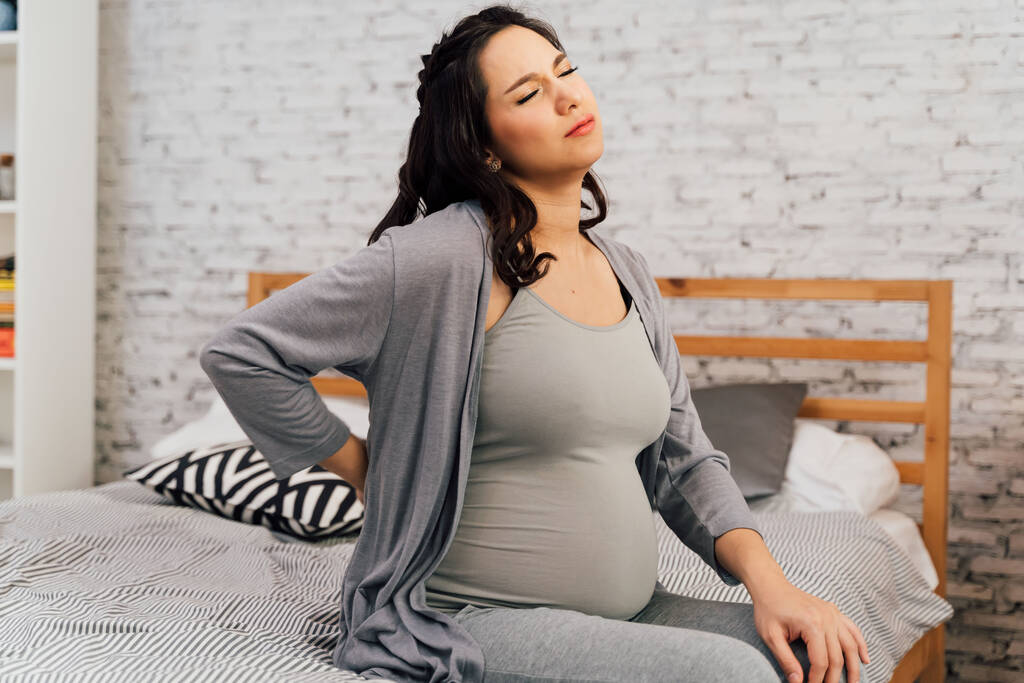Discover how long postpartum back pain typically lasts and gain a comprehensive overview of this common issue.
How Long Does Postpartum Back Pain Last? An Overview
Welcoming a new bundle of joy into the world is undoubtedly a precious and fulfilling experience. But let’s face it—bringing a baby into this world is no small feat, and the toll it takes on your body can often leave you feeling sore and achy, especially in your back. Ah yes, the infamous postpartum back pain. Today, we’re delving into the depths of this common concern and answering the burning question on every new mom’s mind: just how long does postpartum back pain last? So grab a cozy spot, put on your comfiest nursing pajamas, and let’s dive in!

Understanding Postpartum Back Pain
Before we jump into the nitty-gritty, let’s take a moment to understand what postpartum back pain actually is. It’s like your body’s way of saying, “Hey momma, I’ve been through something incredible, and I need some time to recover!” Your spine, muscles, and ligaments go through significant changes during pregnancy and childbirth, leading to discomfort and pain in the lower back region.
But what exactly happens to your body during this transformative time? Let’s dive deeper into the anatomy of postpartum back pain.
The Anatomy of Postpartum Back Pain
So, where exactly does this pesky pain come from? Well, your back is a complex structure composed of bones, muscles, and ligaments that work together to keep you upright and allow for smooth movement. During pregnancy, your growing belly puts additional stress on your lower back, causing strain on the muscles and ligaments supporting it. The result? Ouch!
But that’s not all—hormonal changes play a part in this pain party too. The wonder hormone relaxin, which helps loosen your joints in preparation for childbirth, can also cause those supportive ligaments in your back to become a little too relaxed, further contributing to the not-so-fun backache.
Now that we have a better understanding of the physical changes happening in your body, let’s explore the common causes of postpartum back pain.
Common Causes of Postpartum Back Pain
Now that we understand the basics, let’s explore the common culprits behind postpartum back pain. From the strain of carrying your precious cargo for nine months to the physical demands of delivering a tiny human being, it’s no wonder your back is begging for some relief. But fear not, dear momma, understanding these causes can help you navigate your way towards a pain-free (or at least pain-manageable) future.
First up is pregnancy itself. As your baby grows, your center of gravity shifts, putting extra pressure on your lower back. Combine that with the added weight, and voila—your back feels like it’s auditioning for a role in the next season of “Back Pain: The Musical.
Then comes the main event—labor and delivery. Whether you opted for an unmedicated natural birth, an epidural, or ended up with a surprise C-section, the strain on your back is real. Pushing, pulling, and contorting your body into various positions can leave your postpartum body feeling like it went twelve rounds with a heavyweight champ.
And let’s not forget about those sleepless nights spent rocking, feeding, and soothing your adorable little bundle. Oh, the sacrifices we make for our little ones! All those hunched-over stances and late-night wriggles can take a toll on your back, leaving you feeling as tired as the baby you’re trying to lull to sleep.
But wait, there’s more! Postpartum back pain can also be influenced by factors such as poor posture while breastfeeding, lack of exercise, and even the emotional stress that comes with being a new mom. It’s a perfect storm of physical and emotional challenges that can leave your back feeling less than stellar.
Now that we’ve explored the causes of postpartum back pain, it’s important to remember that you’re not alone in this journey. Many mothers experience this discomfort, and there are ways to find relief and support.
So, dear momma, take a deep breath and know that understanding the anatomy and causes of postpartum back pain is the first step towards finding the relief you deserve. You’ve been through an incredible journey, and now it’s time to prioritize your own well-being. Your back will thank you!
The Duration of Postpartum Back Pain
Now, let’s address the big elephant in the room—how long does this postpartum back pain stick around for? While every mom’s experience is unique, there are a few key factors that influence the duration of your discomfort. So, don’t despair, momma, because there’s light at the end of this back pain tunnel.
Factors Influencing the Length of Postpartum Back Pain
First off, let’s talk about your individual circumstances. Factors such as your pre-pregnancy fitness level, any previous history of back pain, and the specific details of your pregnancy and delivery can impact how long your back pain lingers. So, if someone tells you they have a definitive timeline for when your pain will disappear, take it with a pinch of salt, or rather, a pinch of Himalayan pink salt because why not?
Secondly, your body’s natural healing abilities come into play. Postpartum recovery is a marathon, not a sprint, and everybody’s marathon time is different. Your body needs time to recalibrate and repair itself, adjusting to the monumental changes it went through during pregnancy and labor. So, momma, go easy on yourself and listen to your body—it’s a pretty wise machine.
Average Time Frame for Postpartum Back Pain
While we can’t slap an exact timeframe onto your postpartum back pain, we can give you a rough estimate to ease your curious mom-brain. Most cases of postpartum back pain gradually improve within a few weeks to a few months after delivery. That’s right—there is an end to this chapter, and it’s not too far away!
However, it’s essential to remember that everyone is unique, and what works for your best mom friend might not work for you. So, sink into your favorite rocking chair, put on your favorite knee-high fluffy socks, and let’s explore some strategies to manage that pesky back pain until it’s nothing but a distant memory.
Managing Postpartum Back Pain
Now that we have a basic understanding of what’s causing that achy back, let’s dive into some ways you can manage and alleviate that discomfort. Remember, it’s crucial to consult with your healthcare provider before trying any new treatments or exercises.
Non-Medical Ways to Alleviate Postpartum Back Pain
Before we delve into those tempting over-the-counter remedies, let’s start with some non-medical ways to help ease your back pain. First and foremost, rest is essential during the early postpartum period, so don’t feel guilty about taking it slow and giving your body the recovery time it deserves. Those dishes can wait—your health and well-being come first!
Incorporate gentle exercises into your routine, focusing on strengthening your core and back muscles. Say hello to pelvic tilts, gentle yoga, and tai chi—a mat, a sense of calm, and some soothing tunes are all you need for this pain-relieving adventure. And hey, if you need to bust out some funky dance moves while your baby giggles along, even better!
Heat and cold therapy can also be your newest besties when it comes to reducing back pain. Apply a warm compress or soak in a relaxing bath to soothe those aching muscles. If you prefer the cool route, try an ice pack or a cold gel pack wrapped in a thin towel—pro tip: skip the frozen bag of peas and opt for something a little more glamorous, like a chilled silk eye mask. You deserve the treat, momma!
Medical Treatments for Postpartum Back Pain
If your postpartum back pain persists or becomes severe, it’s time to seek help from your healthcare provider. They’ll be your guiding light on this back pain journey, providing professional advice tailored to your unique situation. The choices may range from physical therapy and massages to the safe use of pain relievers if necessary. Remember, momma, you don’t have to go through this alone—there’s a whole team of experts waiting to support you!
When to Seek Medical Attention
While most cases of postpartum back pain improve with self-care and time, it’s essential to recognize when it’s time to seek medical attention. Remember, moms are superheroes, but even superheroes need a helping hand sometimes.

Signs Your Postpartum Back Pain Needs Medical Attention
If your back pain is accompanied by numbness or weakness in your legs, difficulty controlling your bladder or bowel movements, or severe pain that doesn’t improve with rest, it’s time to pick up the superhero hotline (a.k.a your phone) and call your healthcare provider. These signs may indicate a more serious issue, and it’s essential to get the appropriate care.
Let’s not forget the importance of regular check-ups post-delivery either. These visits provide a chance for your healthcare provider to monitor your recovery and address any concerns you may have. So, don’t skip those check-ups, momma—they’re your ticket to a pain-free future!
Preventing Postpartum Back Pain
As they say, prevention is better than cure, and the same principle applies to postpartum back pain. While we can’t guarantee complete prevention, taking some precautions during pregnancy can help reduce your risk. After all, an ounce of prevention is worth a pound of back pain relief!
Precautions During Pregnancy
During pregnancy, listen to your body and give it the care it needs. Avoid heavy lifting whenever possible, and opt for proper body mechanics when you do need to pick up those adorable baby essentials. Remember to bend at the knees—not the waist—and engage those core muscles to protect your back.
Investing in a supportive mattress and using pillows to maintain optimal sleep positions can work wonders, as can choosing the right footwear that provides adequate arch support. And let’s be honest, mommas, who needs an excuse to shop for cute, comfortable shoes?
Postnatal Exercises and Their Benefits
After your little one makes their grand entrance, easing back into exercises and movements that strengthen your core and back muscles can go a long way in preventing future back pain. From gentle stretches to low-impact cardio exercises, incorporating postnatal workouts into your routine can help your body recover and regain its strength. Plus, it’s a great way to sneak in some much-needed “mommy time” while bonding with your baby at the same time!
Remember that your body is unique, and what works for one mom may not work for another. So, be patient with yourself, listen to your body, and don’t hesitate to seek advice from your healthcare provider if you have any concerns.
As we wrap up this back pain exploration, dear momma, we hope we’ve shed some light on the duration, management, and prevention of postpartum back pain. While it may feel like an eternity when you’re in the midst of it, rest assured that this too shall pass. So, keep rocking those comfy nursing pajamas, take care of yourself, and cherish every moment of this incredible journey called motherhood. After all, you’re one strong and resilient momma—back pain is simply no match for you!



